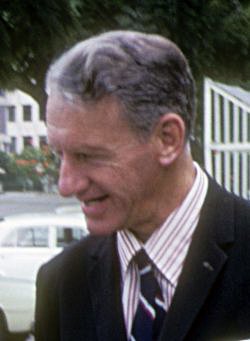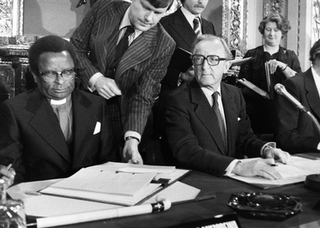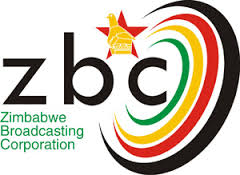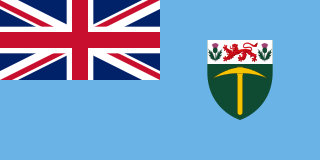Related Research Articles

Rhodesia, officially from 1970 the Republic of Rhodesia, was an unrecognised state in Southern Africa from 1965 to 1979. During this fourteen-year period, Rhodesia served as the de facto successor state to the British colony of Southern Rhodesia, and in 1980 it became modern day Zimbabwe.

Ian Douglas Smith was a Rhodesian politician, farmer, and fighter pilot who served as Prime Minister of Rhodesia from 1964 to 1979. He was the country's first leader to be born and raised in Rhodesia, and led the predominantly white government that unilaterally declared independence from the United Kingdom in November 1965 in opposition to their demands for the implementation of majority rule as a condition for independence. His 15 years in power were defined by the country's international isolation and involvement in the Rhodesian Bush War, which pitted the Rhodesian Security Forces against the Soviet- and Chinese-funded military wings of the Zimbabwe African National Union (ZANU) and Zimbabwe African People's Union (ZAPU).

Zimbabwe Rhodesia, alternatively known as Zimbabwe-Rhodesia, also informally known as Zimbabwe or Rhodesia, was a short-lived sovereign state that existed from 1 June 1979 to 18 April 1980, though it lacked international recognition. Zimbabwe Rhodesia was preceded by another state named the Republic of Rhodesia and was briefly under a British-supervised transitional government sometimes referred to as a reestablished Southern Rhodesia, which according to British constitutional theory had remained the lawful government in the area after Unilateral Declaration of Independence (UDI) in 1965. About three months later, the re-established colony of Southern Rhodesia was granted internationally-recognized independence within the Commonwealth as the Republic of Zimbabwe.

The Lancaster House Agreement refers to an agreement signed on 21 December 1979 in Lancaster House, following the conclusion of a constitutional conference where different parties discussed the future of Zimbabwe Rhodesia, formerly known as Rhodesia. The agreement effectively concluded the Rhodesian Bush War. It also marked the nullification of Rhodesia's Unilateral Declaration of Independence, as British colonial authority was to be restored for a transition period, during which free elections under supervision by the British government would take place. Crucially, ZANU and ZAPU, the political wings of ZANLA and ZIPRA, would be permitted to stand candidates in the forthcoming elections. This was however conditional to compliance with the ceasefire and the verified absence of voter intimidation.

The Rhodesian Front (RF) was a conservative political party in Southern Rhodesia, subsequently known as Rhodesia. Formed in March 1962 by white Rhodesians opposed to decolonisation and majority rule, it won that December's general election and subsequently spearheaded the country's Unilateral Declaration of Independence (UDI) from the Federation of Rhodesia and Nyasaland in 1965, remaining the ruling party and upholding white minority rule through the majority of the Bush War until 1979. Initially led by Winston Field, the party was led through most of its lifetime by co-founder Ian Smith. Following the end of the Bush War and the country's reconstitution as Zimbabwe, it changed its name to the Republican Front in 1981.

The Conservative Alliance of Zimbabwe (CAZ) was the final incarnation of a party formerly called the Republican Front, and prior to that it was called the Rhodesian Front (RF). In the immediate post-independence period, the party sought to promote the position of White Zimbabweans and did not initially seek support amongst other ethnic groups. Following the abolition of the "white roll" seats in parliament, the CAZ attempted to distance itself from its past and appeal to black voters.

The Zimbabwe Broadcasting Corporation (ZBC) is the state-owned broadcaster in Zimbabwe. It was established as the Rhodesian Broadcasting Corporation (RBC), taking its current name in 1980. Like the RBC before it, the ZBC has been accused of being a government mouthpiece with no editorial independence.

The Rhodesian Bush War, also known as the Second Chimurenga, was a civil conflict from July 1964 to December 1979 in the unrecognised country of Rhodesia.

Edgar Zivanai Tekere, nicknamed "2 Boy", was a Zimbabwean politician. He was the second and last Secretary General of the Zimbabwe African National Union (ZANU) who organised the party during the Lancaster House talks and served in government before his popularity as a potential rival to Robert Mugabe caused their estrangement.

General elections were held in Southern Rhodesia between 14 February and 4 March 1980 to elect the members of the House of Assembly of the first Parliament of the independent Zimbabwe. As stipulated by the new Constitution of Zimbabwe produced by the Lancaster House Conference, the new House of Assembly was to comprise 100 members, 80 of whom would be elected proportionally by province by all adult citizens on a common roll, and 20 of whom would be elected in single-member constituencies by whites on a separate roll.

Robert Gabriel Mugabe was a Zimbabwean revolutionary and politician who served as Prime Minister of Zimbabwe from 1980 to 1987 and then as President from 1987 to 2017. He served as Leader of the Zimbabwe African National Union (ZANU) from 1975 to 1980 and led its successor political party, the ZANU – Patriotic Front (ZANU–PF), from 1980 to 2017. Ideologically an African nationalist, during the 1970s and 1980s he identified as a Marxist–Leninist, and as a socialist during the 1990s and the remainder of his career.

The Geneva Conference took place in Geneva, Switzerland during the Rhodesian Bush War. Held under British mediation, its participants were the unrecognised government of Rhodesia, led by Ian Smith, and a number of rival Rhodesian black nationalist parties: the African National Council, led by Bishop Abel Muzorewa; the Front for the Liberation of Zimbabwe, led by James Chikerema; and a joint "Patriotic Front" made up of Robert Mugabe's Zimbabwe African National Union and the Zimbabwe African People's Union led by Joshua Nkomo. The purpose of the conference was to attempt to agree on a new constitution for Rhodesia and in doing so find a way to end the Bush War raging between the government and the guerrillas commanded by Mugabe and Nkomo respectively.

The Victoria Falls Conference took place on 26 August 1975 aboard a South African Railways train halfway across the Victoria Falls Bridge on the border between the unrecognised state of Rhodesia and Zambia. It was the culmination of the "détente" policy introduced and championed by B. J. Vorster, the Prime Minister of South Africa, which was then under apartheid and was attempting to improve its relations with the Frontline States to Rhodesia's north, west and east by helping to produce a settlement in Rhodesia. The participants in the conference were a delegation led by the Rhodesian Prime Minister Ian Smith on behalf of his government, and a nationalist delegation attending under the banner of Abel Muzorewa's African National Council (UANC), which for this conference also incorporated delegates from the Zimbabwe African National Union (ZANU), the Zimbabwe African People's Union (ZAPU) and the Front for the Liberation of Zimbabwe (FROLIZI). Vorster and the Zambian President Kenneth Kaunda acted as mediators in the conference, which was held on the border in an attempt to provide a venue both sides would accept as neutral.

The modern political history of Zimbabwe starts with the arrival of white people to what was dubbed Southern Rhodesia in the 1890s. The country was initially run by an administrator appointed by the British South Africa Company. The prime ministerial role was first created in October 1923, when the country achieved responsible government, with Sir Charles Coghlan as its first Premier. The third premier, George Mitchell, renamed the post prime minister in 1933.
William John Harper was a politician, general contractor and Royal Air Force fighter pilot who served as a Cabinet minister in Rhodesia from 1962 to 1968, and signed that country's Unilateral Declaration of Independence (UDI) from Britain in 1965. Born into a prominent Anglo-Indian merchant family in Calcutta, Harper was educated in India and England and joined the RAF in 1937. He served as an officer throughout the Second World War and saw action as one of "The Few" in the Battle of Britain, during which he was wounded in action. Appalled by Britain's granting of independence to India in 1947, he emigrated to Rhodesia on retiring from the Air Force two years later.

The Centre Party (CP) was a liberal political party in Rhodesia. Founded in 1968, it was a multiracial party opposed to the policies of the country's Rhodesian Front-dominated white minority government. It dissolved in 1977.

David Colville Smith was a farmer and politician in Rhodesia and its successor states, Zimbabwe Rhodesia and Zimbabwe. He served in the cabinet of Rhodesia as Minister of Agriculture from 1968 to 1976, Minister of Finance from 1976 to 1979, and Minister of Commerce and Industry from 1978 to 1979. From 1976 to 1979, he also served Deputy Prime Minister of Rhodesia. He continued to serve as Minister of Finance in the government of Zimbabwe Rhodesia in 1979. In 1980, he was appointed Minister of Trade and Commerce of the newly independent Zimbabwe, one of two whites included in the cabinet of Prime Minister Robert Mugabe.

Turkey has an embassy in Harare. Zimbabwe opened its embassy in Ankara on October 3, 2019.

Rhodesia, was a self-governing British Crown colony in southern Africa. Until 1964, the territory was known as Southern Rhodesia, and less than a year before the name change the colony formed a part of the Federation of Rhodesia and Nyasaland and hosted its capital city, Salisbury. On 1 January 1964, the three parts of the Federation became separate colonies as they had been before the founding of the Federation on 1 August 1953. The demise of the short-lived union was seen as stemming overwhelmingly from black nationalist movements in Northern Rhodesia and Nyasaland, and both colonies were fast-tracked towards independence - Nyasaland first, as Malawi, on 6 July 1964 and Northern Rhodesia second, as Zambia, on 24 October. Southern Rhodesia, by contrast, stood firmly under white government, and its white population, which was far larger than the white populations elsewhere in the erstwhile Federation, was, in general, strongly opposed to the introduction of black majority rule. The Southern Rhodesian prime minister, Winston Field, whose government had won most of the federation's military and other assets for Southern Rhodesia, began to seek independence from the United Kingdom without introducing majority rule. However, he was unsuccessful and his own party, the Rhodesian Front, forced him to resign. Days prior to his resignation, on Field's request, Southern Rhodesia had changed its flag to a sky blue ensign defaced with the Rhodesian coat of arms, becoming the first British colony to use a sky blue ensign instead of a dark blue one.
References
- ↑ John McLaughlin, "Ian Smith and the Future of Zimbabwe," The National Review, October 30, 1981, pp. 2168-70; William C. Pollard, Jr., A Career of Defiance: The Life of Ian Smith (Topeka, Kans.: Agusan River Publishing Co., 1992), pp. 105-7, 131.
- ↑ Pollard, p. 112, 131; Facts on File, 1984 ed., p. 574
- ↑ "Ian Smith Invites Blacks to Join His Party", The New York Times, July 23, 1984, p. A5.